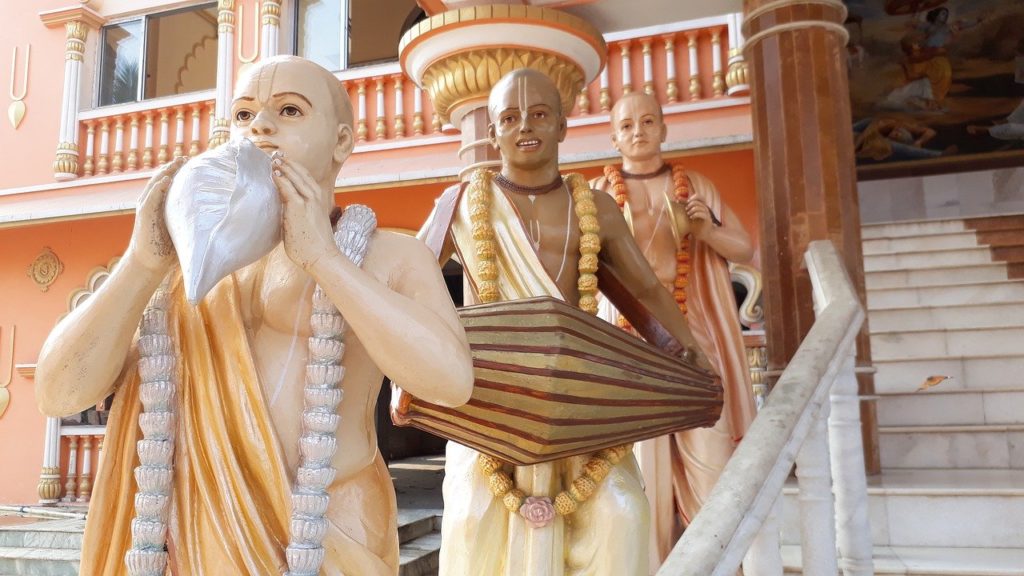
(The below is adapted from Srila Bhaktivinoda Thakura’s ‘Prema Pradipa’ and talks in length about the two Types of Yoga – Bhakti Yoga and Ashtanga Yoga. The following is an excerpt of the enlightening conversation between Sri Premadasa babaji and an Ashtanga Yogi)
yamadaibhir yoga pathaih
kama-lobha hato muhuh
mukunda-sevaya yadvat
tathatmaddha na samyati
(Srimad Bhagavatam, 1.6.35)
–
Though it is true that by exercising restraint of the senses by the yoga system one can get respite from the disturbances of desire and lust, yet this is not sufficient to give satisfaction to the soul, for this is derived from devotional service unto the Supreme Lord.
Citing the above verse, Sri Premadasa Babaji added that Yama, Niyama, asana, Pranayama, pratyahara, dhyana, Dharana, and samadhi constitute the process of Ashtanga Yoga. It is true that by practicing them one achieves peace. However in certain circumstances, the practitioner, being overwhelmed with lust and greed, may indulge himself in relishing some trivial intermediary results. Thus instead of persevering for the ultimate objective of peace, he may fall down and get derailed from his Yogic practice. But in the process of rendering devotional service unto Sri Krishna, there is no chance of receiving any intermediary results. Hence a servant of Lord Krishna, definitely obtains his desired peace.
In this assembly was present an ‘Ashtanga Yogi’, who could not agree with Sri Premadasa Babaji completely. Although this Ashtanga Yogi was a Vaishnava, yet he had practiced the process of Ashtanga Yoga for many years and had achieved perfection in this path. As a consequence he prioritized the process of Ashtanga Yoga over the ninefold processes of bhakti yoga.
This yogi exclaimed,” Babaji, Do not belittle the process of Ashtanga yoga. The yogis, despite living for so long, can go without food or sleep for days. Is it possible for you to execute devotional service as sincerely and as intensely as they can? Therefore you should understand that the path of Yoga is superior to that of arcana (worship).
Vaishnavas are naturally disinclined to engage themselves in confronting debates. However no one in the assembly liked the yogi-Vaishnava’s statement minimizing the importance of bhakti yoga over Ashtanga yoga. But everyone stayed silent. The yogi felt embarrassed and requested Premadasa Babaji to state his conclusion on this subject. Premadasa Babaji was initially disinclined to enter into the argument. However, when the yogi repeatedly assured him that he would accept his conclusion, the Babaji spoke as follows –
Types of Yoga – Superiority of Bhakti Yoga
The ultimate objective of both Yoga practice and devotional service is Bhagavan (the Supreme Personality of Godhead) who is the worshipable object of all living entities. The living entities can broadly be classified into two – pure and conditioned. Those living beings who have no connection with and are completely transcendental to material nature are pure living entities. While those who are entangled in material nature are conditioned living beings. The ‘Sadhaka’ or the ‘practitioner’ is a conditioned living entity while the pure living entity has nothing to practice (for it is already perfect). The difference between the two is that a pure living entity is already situated in his constitutional position (as a servant of the Lord); therefore his actions are completely spiritual and his nature is pure bliss.
On the other hand, a conditioned living being is entangled in material nature and accepts materially designated duties which are of mixed material and spiritual qualities.

Rejecting such materially designated duties and accepting pure duties based upon one’s constitutional position, is termed as liberation. Achieving the pure love of God and achieving liberation cannot be two different things. The deliverance sought by yogic practice is the same as the love of Godhead achieved by practicing devotional service. Therefore the ultimate objective of both these practices is the same. It is for this reason that the Vedic scriptures often describe the great devotee Sukadeva Goswami as a Maha-yogi while the foremost Yogi Lord Shiva is often depicted as a great devotee.
The principal difference between the paths of Yoga and devotional service is that by strictly practicing Yoga, when one attains samadhi by giving up his temporary designations, he achieves his constitutional position -thereby awakening Prema (pure love of God). The only fear is that it takes a significant amount of time to achieve this ultimate goal, through the process of Ashtanga Yoga. Therefore it is quite probable for the practitioner to get bewildered and overwhelmed by some trivial intermediary by-products and fall down before achieving perfection.
On the other hand, the process of devotional service only deals with Prema (pure love of God). Devotional service is simply the cultivation of this science of love. When all activities in a process are geared towards achieving the ultimate result, there is no fear of ending up with any insignificant trivial results. The means are the end and the end are the means. Therefore the path of devotional service is simpler as compared to Ashtanga Yoga and should be accepted by all.
The path of Ashtanga Yoga is full of impediments :
The control over material nature that is gained by the practice of Yoga is only a temporary result. This often leads to further difficulties. Firstly while practicing Yama and Niyama, the fruit of religiosity is awakened. Being overwhelmed with this trivial result, one might take pleasure in being renowned as being religious-minded without further endeavoring to achieve Prema (love of God), the ultimate objective.
Secondly, by practicing asana and pranayama for a prolonged time, one might obtain a long life free from diseases. But if this long life is devoid of Prema, then it becomes a source of trouble.
By practicing Yoga, one gains control of his senses by withdrawing them (pratyahara). However, if one does not develop the love of God in the process, then the subsequent renunciation manifested by such a Sadhaka is only dry and trivial. Accepting or rejecting anything for the ultimate spiritual objective is evenly fruitful. However, if the ultimate objective is missing, then such meaningless renunciation only ends up making one stone-hearted.
During Dhyana, Dharana, and Samadhi if one can remove material thoughts but is unable to evoke divine love (Prema), then such a living entity loses his individuality. If the understanding of ‘I am Brahman’ does not result in invoking the pure love of God, then it destroys one’s existence or individuality.

Hence please consider that though the ultimate objective of Yoga is wonderful, yet its path is full of impediments. On the other hand the process of devotional service is free from such complications. Then addressing the yogi, Sri Premadasa Babaji exclaimed, ‘You are a Vaishnava and a Yogi. Hence you shall be able to understand my words without any bias’. Even before the babaji had finished, the assembled Vaishnavas highly appreciated his excellent response.
Types of Yoga – The Yogi responds :
The Yogi Babaji responded by saying, ’Babaji, your conclusions are wonderful but I have something to say in this regard. Before practicing Ashtanga Yoga, I had practiced the nine limbs of devotional service, beginning with hearing and chanting. But frankly, my senses were so strong that practically in every action, I sought out sense gratification. I could not untangle my heart from the false designations as described in Vaishnava instructions on conjugal rasa. Only after I practiced Pratyahara (withdrew my senses through Ashtanga Yoga), could I relish the spiritual essence of conjugal rasa. Now, I do not desire for sense gratification anymore. There is a provision for practicing Pranayama in Arcana (worship). I feel that this practice has been suggested as pratyahara or withdrawing one’s senses in bhakti yoga. Therefore I feel that Yogic practices are also essential’.
Bhakti Yoga cannot be practiced as a dry selfish fruitive ritual :
Sri Premadasa babaji thought about the Yogi’s statements for a while. Then he replied as follows –
‘Babaji, you are blessed for you did not forget rasa-tattva (devotional mellows) even while exercising ‘Pratyahara’ (withdrawal of senses). In most cases, dry speculation and dry practices cause fall down from one’s spiritual path. It is because the soul, being full of bliss, cannot appreciate dryness. The soul is always in love. Therefore if it loses touch with the divine, then it gets attached to the inferior material objects. As self-satisfaction grows far-fetched, one begins indulging in sense gratification. When this soul, which is the Lord of the senses, happens to come in contact with its eternal Rasa, its spontaneous attraction awakens and its material desire diminishes. Bhakti Yoga or the path of devotion is nothing but the discussions of love for the Supreme Lord. The more one is attached to it, the lesser he entangles himself in sense gratification.

I believe, when you practiced devotional service, you had not received the association of pure devotees. You have executed the ninefold processes of devotional service as if they were some dry fruitive selfish rituals. As a consequence, you did not obtain even a drop of transcendental bliss. And it is for this reason that the urge to satisfy your senses increased. Under these circumstances, there is a chance of getting some benefit by practicing Yoga. The practicing devotee must relish the mellows of devotion in the association of other devotees. Even though a devotee experiences all kinds of material sense gratification, this enjoyment does not affect him or lead to a craving for more enjoyment. Sense enjoyment is the primary cause of devotees’ rejecting the desire for material enjoyment’.
The Yogi revealed that he did not previously know about this matter and expressed his gratitude for Sri Premadasa Babaji’s words.